Analysis of Contract Law and Australian Trust Law Case Study
VerifiedAdded on 2023/01/03
|6
|1732
|37
Case Study
AI Summary
This case study solution addresses two legal issues: contract law and Australian trust law. The first case examines whether a contract was formed between a diamond jeweler and a buyer, focusing on offer, acceptance, and the application of the Electronic Transactions Act 1999 concerning email communication. It concludes that a contract was likely formed due to the buyer's timely email acceptance. The second case explores the implications of setting up a family trust under Australian Trust Law for tax benefits and asset protection. It discusses the duties of a trustee and the suitability of a discretionary trust for a businesswoman aiming to secure her children's future and manage her assets efficiently. The analysis emphasizes the benefits of a family trust, including asset protection, inheritance planning, and tax savings, ultimately recommending a discretionary trust to fulfill the businesswoman's objectives.
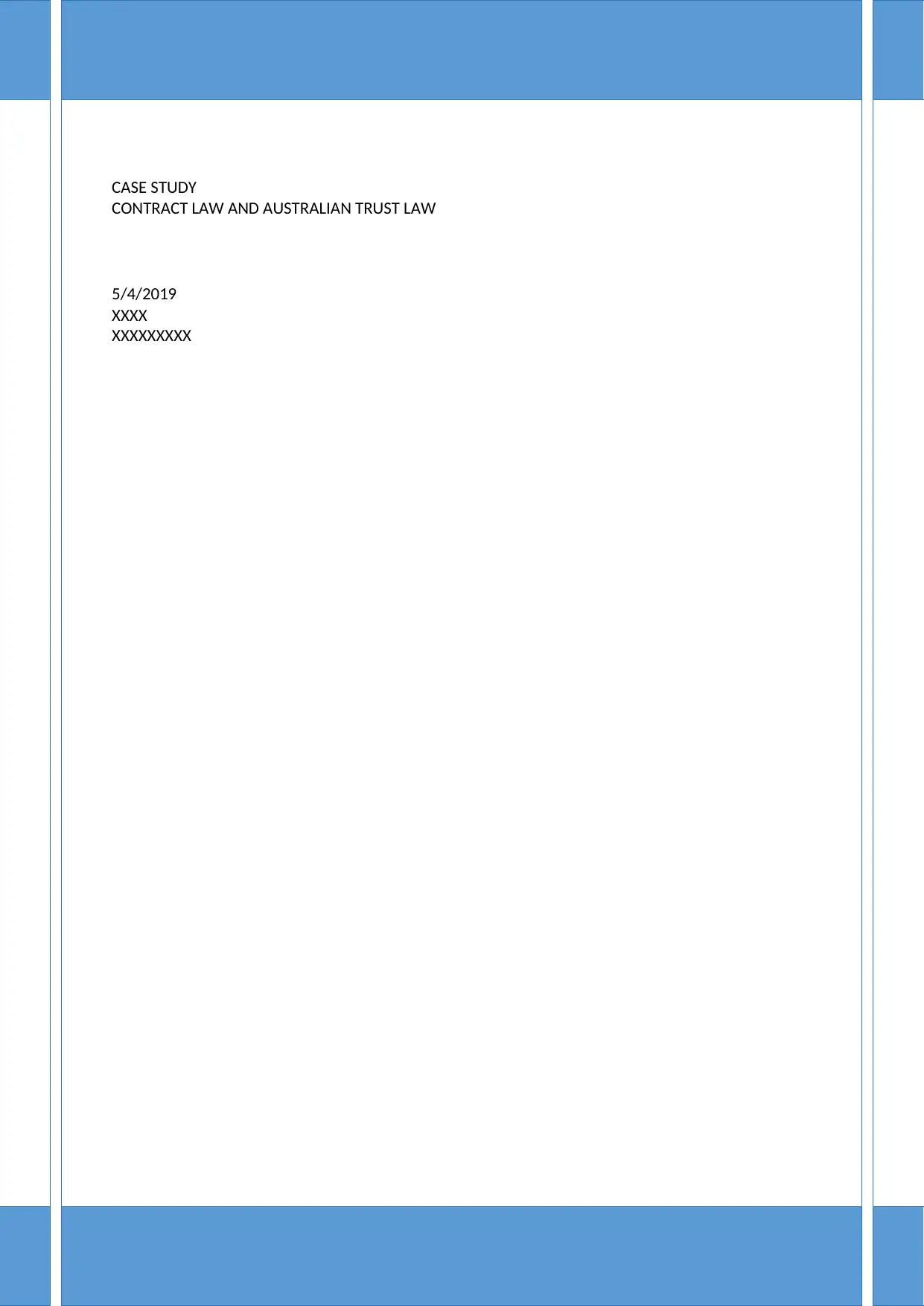
CASE STUDY
CONTRACT LAW AND AUSTRALIAN TRUST LAW
5/4/2019
XXXX
XXXXXXXXX
CONTRACT LAW AND AUSTRALIAN TRUST LAW
5/4/2019
XXXX
XXXXXXXXX
Paraphrase This Document
Need a fresh take? Get an instant paraphrase of this document with our AI Paraphraser
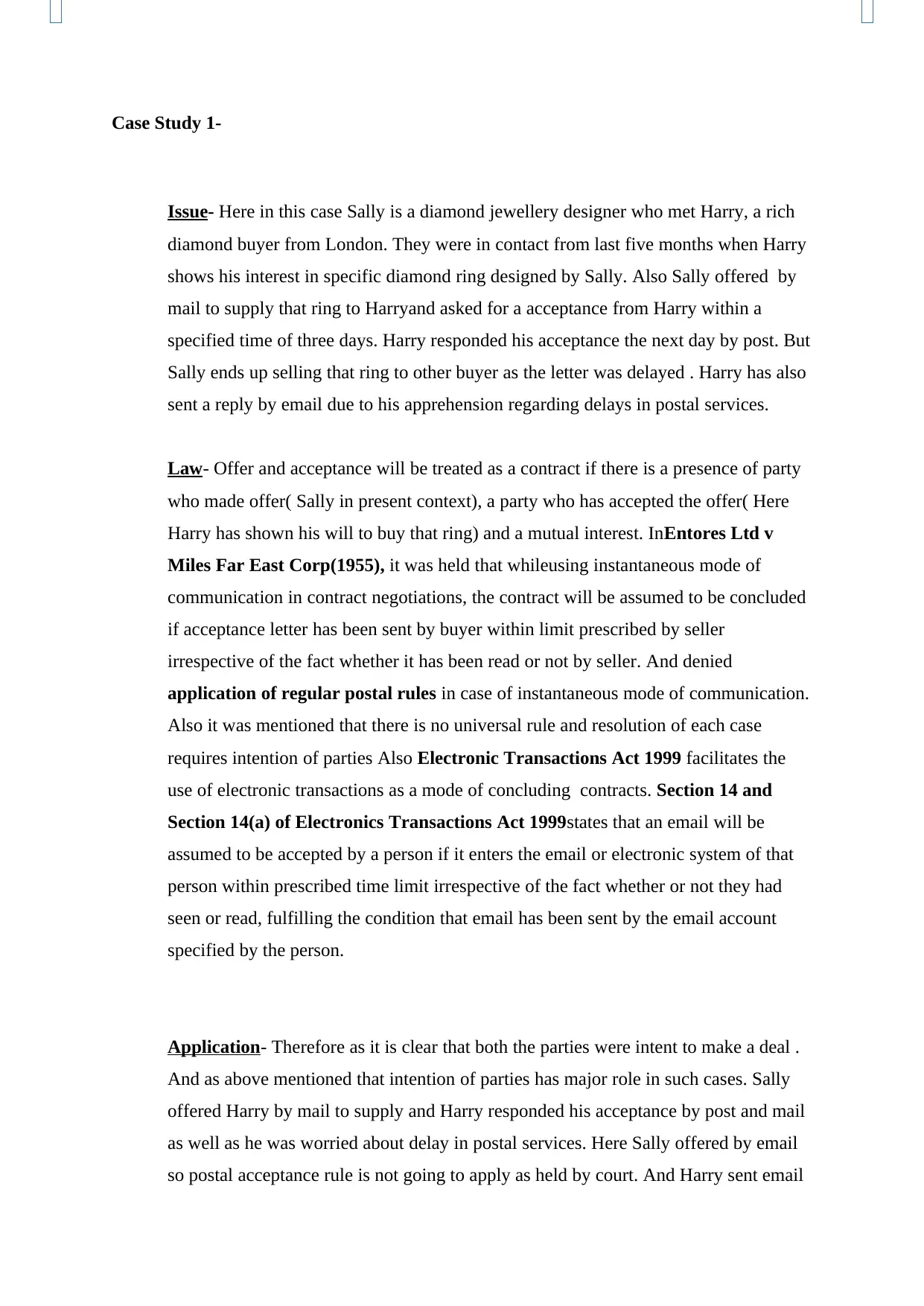
Case Study 1-
Issue- Here in this case Sally is a diamond jewellery designer who met Harry, a rich
diamond buyer from London. They were in contact from last five months when Harry
shows his interest in specific diamond ring designed by Sally. Also Sally offered by
mail to supply that ring to Harryand asked for a acceptance from Harry within a
specified time of three days. Harry responded his acceptance the next day by post. But
Sally ends up selling that ring to other buyer as the letter was delayed . Harry has also
sent a reply by email due to his apprehension regarding delays in postal services.
Law- Offer and acceptance will be treated as a contract if there is a presence of party
who made offer( Sally in present context), a party who has accepted the offer( Here
Harry has shown his will to buy that ring) and a mutual interest. InEntores Ltd v
Miles Far East Corp(1955), it was held that whileusing instantaneous mode of
communication in contract negotiations, the contract will be assumed to be concluded
if acceptance letter has been sent by buyer within limit prescribed by seller
irrespective of the fact whether it has been read or not by seller. And denied
application of regular postal rules in case of instantaneous mode of communication.
Also it was mentioned that there is no universal rule and resolution of each case
requires intention of parties Also Electronic Transactions Act 1999 facilitates the
use of electronic transactions as a mode of concluding contracts. Section 14 and
Section 14(a) of Electronics Transactions Act 1999states that an email will be
assumed to be accepted by a person if it enters the email or electronic system of that
person within prescribed time limit irrespective of the fact whether or not they had
seen or read, fulfilling the condition that email has been sent by the email account
specified by the person.
Application- Therefore as it is clear that both the parties were intent to make a deal .
And as above mentioned that intention of parties has major role in such cases. Sally
offered Harry by mail to supply and Harry responded his acceptance by post and mail
as well as he was worried about delay in postal services. Here Sally offered by email
so postal acceptance rule is not going to apply as held by court. And Harry sent email
Issue- Here in this case Sally is a diamond jewellery designer who met Harry, a rich
diamond buyer from London. They were in contact from last five months when Harry
shows his interest in specific diamond ring designed by Sally. Also Sally offered by
mail to supply that ring to Harryand asked for a acceptance from Harry within a
specified time of three days. Harry responded his acceptance the next day by post. But
Sally ends up selling that ring to other buyer as the letter was delayed . Harry has also
sent a reply by email due to his apprehension regarding delays in postal services.
Law- Offer and acceptance will be treated as a contract if there is a presence of party
who made offer( Sally in present context), a party who has accepted the offer( Here
Harry has shown his will to buy that ring) and a mutual interest. InEntores Ltd v
Miles Far East Corp(1955), it was held that whileusing instantaneous mode of
communication in contract negotiations, the contract will be assumed to be concluded
if acceptance letter has been sent by buyer within limit prescribed by seller
irrespective of the fact whether it has been read or not by seller. And denied
application of regular postal rules in case of instantaneous mode of communication.
Also it was mentioned that there is no universal rule and resolution of each case
requires intention of parties Also Electronic Transactions Act 1999 facilitates the
use of electronic transactions as a mode of concluding contracts. Section 14 and
Section 14(a) of Electronics Transactions Act 1999states that an email will be
assumed to be accepted by a person if it enters the email or electronic system of that
person within prescribed time limit irrespective of the fact whether or not they had
seen or read, fulfilling the condition that email has been sent by the email account
specified by the person.
Application- Therefore as it is clear that both the parties were intent to make a deal .
And as above mentioned that intention of parties has major role in such cases. Sally
offered Harry by mail to supply and Harry responded his acceptance by post and mail
as well as he was worried about delay in postal services. Here Sally offered by email
so postal acceptance rule is not going to apply as held by court. And Harry sent email
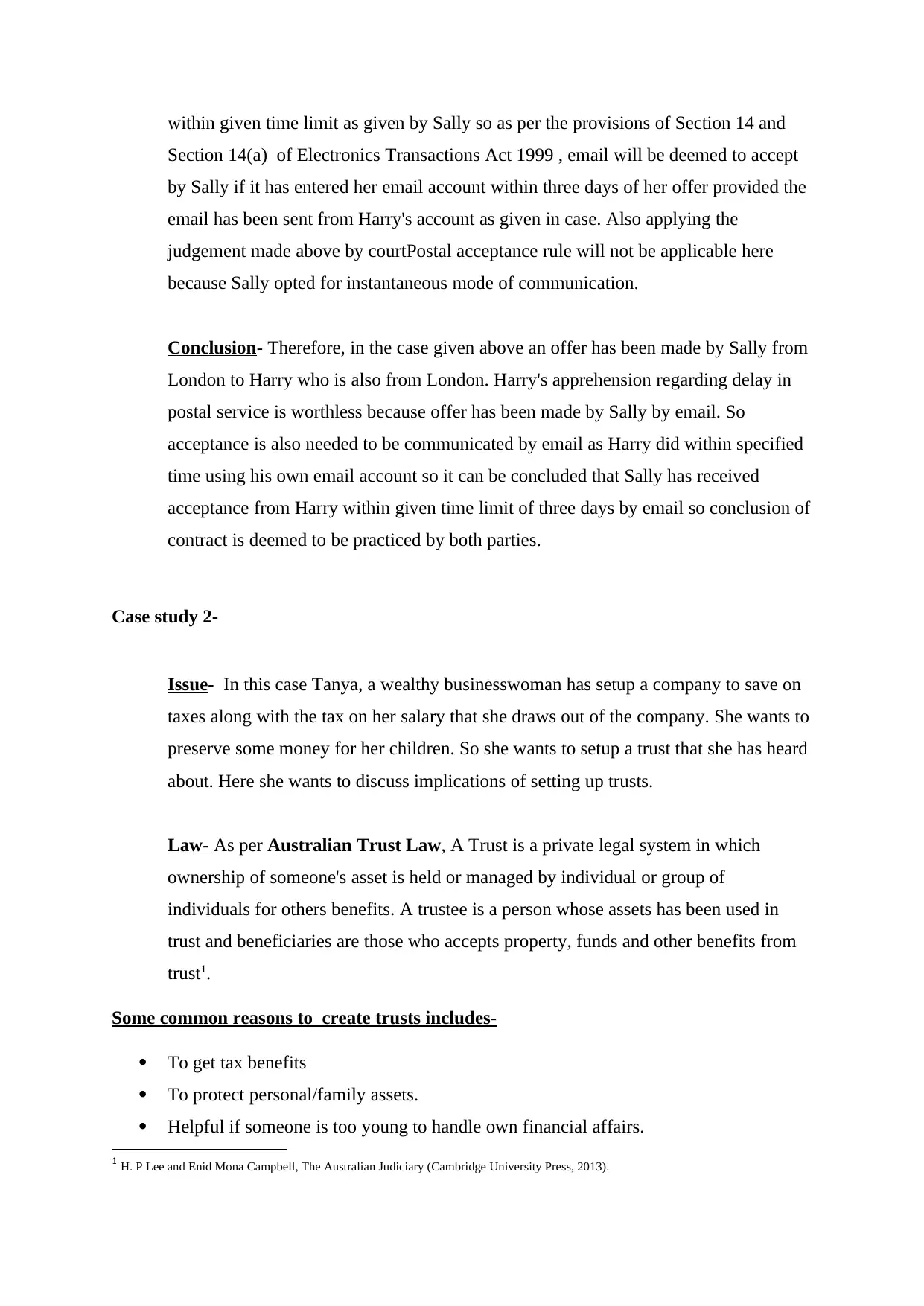
within given time limit as given by Sally so as per the provisions of Section 14 and
Section 14(a) of Electronics Transactions Act 1999 , email will be deemed to accept
by Sally if it has entered her email account within three days of her offer provided the
email has been sent from Harry's account as given in case. Also applying the
judgement made above by courtPostal acceptance rule will not be applicable here
because Sally opted for instantaneous mode of communication.
Conclusion- Therefore, in the case given above an offer has been made by Sally from
London to Harry who is also from London. Harry's apprehension regarding delay in
postal service is worthless because offer has been made by Sally by email. So
acceptance is also needed to be communicated by email as Harry did within specified
time using his own email account so it can be concluded that Sally has received
acceptance from Harry within given time limit of three days by email so conclusion of
contract is deemed to be practiced by both parties.
Case study 2-
Issue- In this case Tanya, a wealthy businesswoman has setup a company to save on
taxes along with the tax on her salary that she draws out of the company. She wants to
preserve some money for her children. So she wants to setup a trust that she has heard
about. Here she wants to discuss implications of setting up trusts.
Law- As per Australian Trust Law, A Trust is a private legal system in which
ownership of someone's asset is held or managed by individual or group of
individuals for others benefits. A trustee is a person whose assets has been used in
trust and beneficiaries are those who accepts property, funds and other benefits from
trust1.
Some common reasons to create trusts includes-
To get tax benefits
To protect personal/family assets.
Helpful if someone is too young to handle own financial affairs.
1 H. P Lee and Enid Mona Campbell, The Australian Judiciary (Cambridge University Press, 2013).
Section 14(a) of Electronics Transactions Act 1999 , email will be deemed to accept
by Sally if it has entered her email account within three days of her offer provided the
email has been sent from Harry's account as given in case. Also applying the
judgement made above by courtPostal acceptance rule will not be applicable here
because Sally opted for instantaneous mode of communication.
Conclusion- Therefore, in the case given above an offer has been made by Sally from
London to Harry who is also from London. Harry's apprehension regarding delay in
postal service is worthless because offer has been made by Sally by email. So
acceptance is also needed to be communicated by email as Harry did within specified
time using his own email account so it can be concluded that Sally has received
acceptance from Harry within given time limit of three days by email so conclusion of
contract is deemed to be practiced by both parties.
Case study 2-
Issue- In this case Tanya, a wealthy businesswoman has setup a company to save on
taxes along with the tax on her salary that she draws out of the company. She wants to
preserve some money for her children. So she wants to setup a trust that she has heard
about. Here she wants to discuss implications of setting up trusts.
Law- As per Australian Trust Law, A Trust is a private legal system in which
ownership of someone's asset is held or managed by individual or group of
individuals for others benefits. A trustee is a person whose assets has been used in
trust and beneficiaries are those who accepts property, funds and other benefits from
trust1.
Some common reasons to create trusts includes-
To get tax benefits
To protect personal/family assets.
Helpful if someone is too young to handle own financial affairs.
1 H. P Lee and Enid Mona Campbell, The Australian Judiciary (Cambridge University Press, 2013).
⊘ This is a preview!⊘
Do you want full access?
Subscribe today to unlock all pages.

Trusted by 1+ million students worldwide
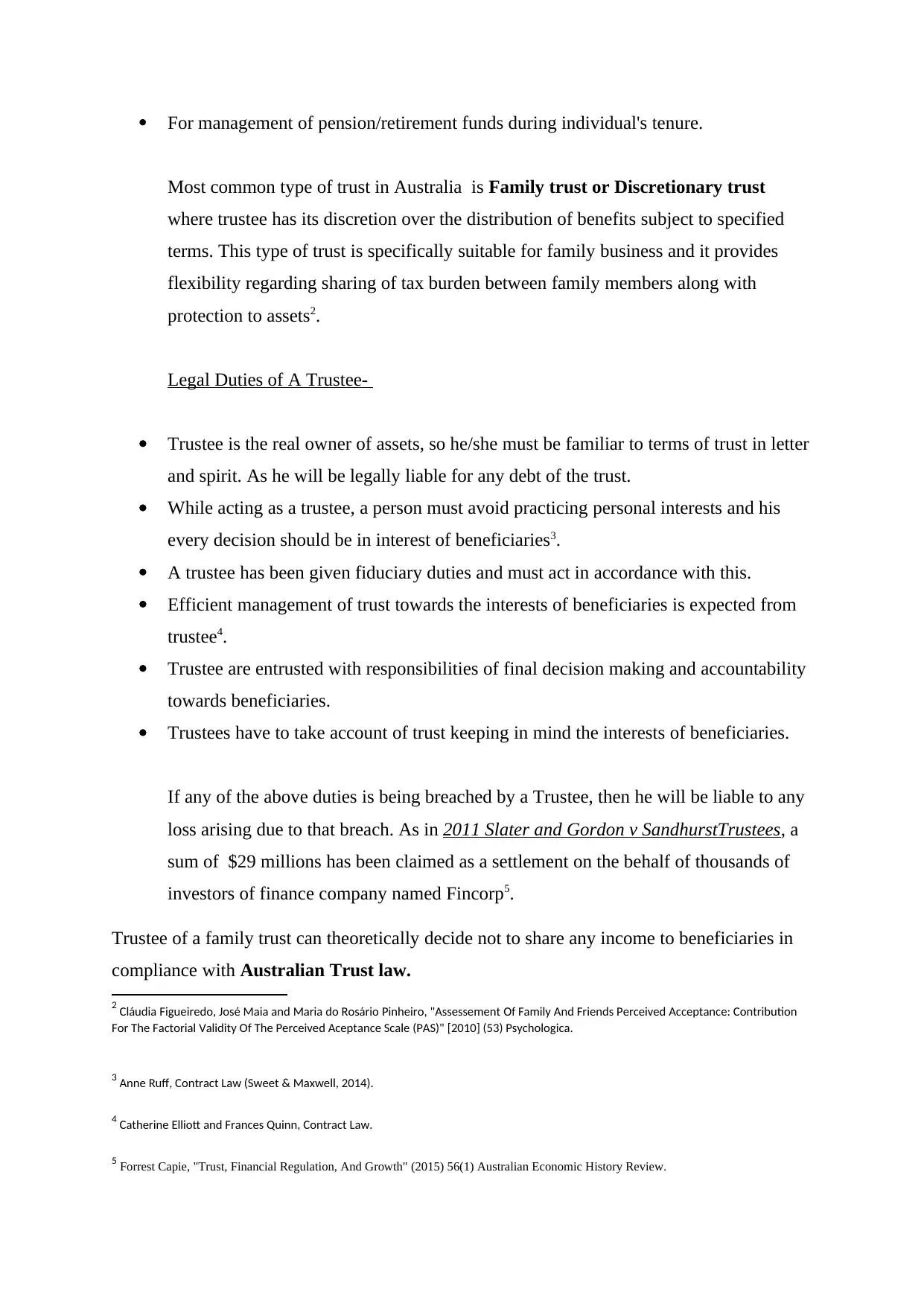
For management of pension/retirement funds during individual's tenure.
Most common type of trust in Australia is Family trust or Discretionary trust
where trustee has its discretion over the distribution of benefits subject to specified
terms. This type of trust is specifically suitable for family business and it provides
flexibility regarding sharing of tax burden between family members along with
protection to assets2.
Legal Duties of A Trustee-
Trustee is the real owner of assets, so he/she must be familiar to terms of trust in letter
and spirit. As he will be legally liable for any debt of the trust.
While acting as a trustee, a person must avoid practicing personal interests and his
every decision should be in interest of beneficiaries3.
A trustee has been given fiduciary duties and must act in accordance with this.
Efficient management of trust towards the interests of beneficiaries is expected from
trustee4.
Trustee are entrusted with responsibilities of final decision making and accountability
towards beneficiaries.
Trustees have to take account of trust keeping in mind the interests of beneficiaries.
If any of the above duties is being breached by a Trustee, then he will be liable to any
loss arising due to that breach. As in 2011 Slater and Gordon v SandhurstTrustees, a
sum of $29 millions has been claimed as a settlement on the behalf of thousands of
investors of finance company named Fincorp5.
Trustee of a family trust can theoretically decide not to share any income to beneficiaries in
compliance with Australian Trust law.
2 Cláudia Figueiredo, José Maia and Maria do Rosário Pinheiro, "Assessement Of Family And Friends Perceived Acceptance: Contribution
For The Factorial Validity Of The Perceived Aceptance Scale (PAS)" [2010] (53) Psychologica.
3 Anne Ruff, Contract Law (Sweet & Maxwell, 2014).
4 Catherine Elliott and Frances Quinn, Contract Law.
5 Forrest Capie, "Trust, Financial Regulation, And Growth" (2015) 56(1) Australian Economic History Review.
Most common type of trust in Australia is Family trust or Discretionary trust
where trustee has its discretion over the distribution of benefits subject to specified
terms. This type of trust is specifically suitable for family business and it provides
flexibility regarding sharing of tax burden between family members along with
protection to assets2.
Legal Duties of A Trustee-
Trustee is the real owner of assets, so he/she must be familiar to terms of trust in letter
and spirit. As he will be legally liable for any debt of the trust.
While acting as a trustee, a person must avoid practicing personal interests and his
every decision should be in interest of beneficiaries3.
A trustee has been given fiduciary duties and must act in accordance with this.
Efficient management of trust towards the interests of beneficiaries is expected from
trustee4.
Trustee are entrusted with responsibilities of final decision making and accountability
towards beneficiaries.
Trustees have to take account of trust keeping in mind the interests of beneficiaries.
If any of the above duties is being breached by a Trustee, then he will be liable to any
loss arising due to that breach. As in 2011 Slater and Gordon v SandhurstTrustees, a
sum of $29 millions has been claimed as a settlement on the behalf of thousands of
investors of finance company named Fincorp5.
Trustee of a family trust can theoretically decide not to share any income to beneficiaries in
compliance with Australian Trust law.
2 Cláudia Figueiredo, José Maia and Maria do Rosário Pinheiro, "Assessement Of Family And Friends Perceived Acceptance: Contribution
For The Factorial Validity Of The Perceived Aceptance Scale (PAS)" [2010] (53) Psychologica.
3 Anne Ruff, Contract Law (Sweet & Maxwell, 2014).
4 Catherine Elliott and Frances Quinn, Contract Law.
5 Forrest Capie, "Trust, Financial Regulation, And Growth" (2015) 56(1) Australian Economic History Review.
Paraphrase This Document
Need a fresh take? Get an instant paraphrase of this document with our AI Paraphraser
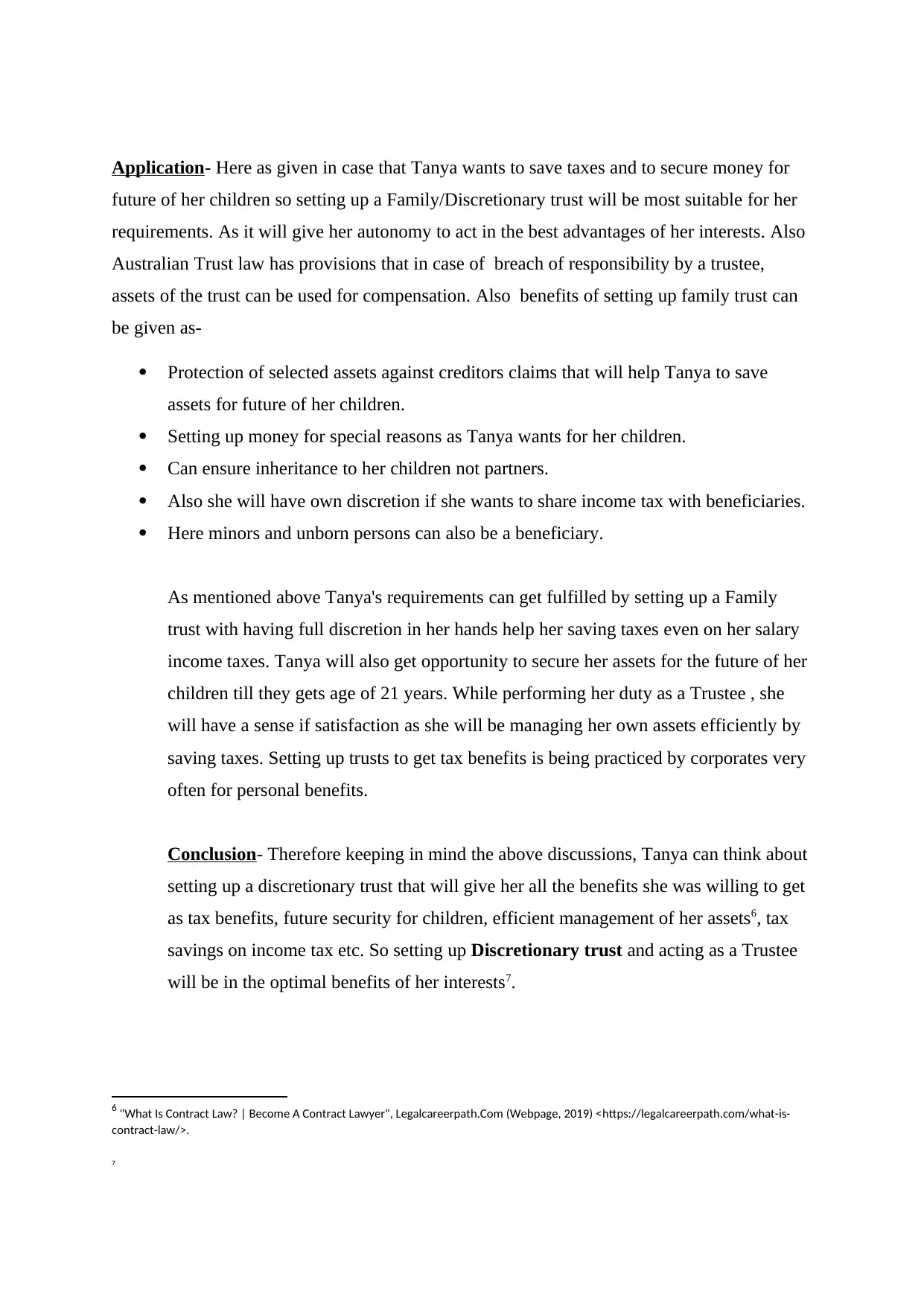
Application- Here as given in case that Tanya wants to save taxes and to secure money for
future of her children so setting up a Family/Discretionary trust will be most suitable for her
requirements. As it will give her autonomy to act in the best advantages of her interests. Also
Australian Trust law has provisions that in case of breach of responsibility by a trustee,
assets of the trust can be used for compensation. Also benefits of setting up family trust can
be given as-
Protection of selected assets against creditors claims that will help Tanya to save
assets for future of her children.
Setting up money for special reasons as Tanya wants for her children.
Can ensure inheritance to her children not partners.
Also she will have own discretion if she wants to share income tax with beneficiaries.
Here minors and unborn persons can also be a beneficiary.
As mentioned above Tanya's requirements can get fulfilled by setting up a Family
trust with having full discretion in her hands help her saving taxes even on her salary
income taxes. Tanya will also get opportunity to secure her assets for the future of her
children till they gets age of 21 years. While performing her duty as a Trustee , she
will have a sense if satisfaction as she will be managing her own assets efficiently by
saving taxes. Setting up trusts to get tax benefits is being practiced by corporates very
often for personal benefits.
Conclusion- Therefore keeping in mind the above discussions, Tanya can think about
setting up a discretionary trust that will give her all the benefits she was willing to get
as tax benefits, future security for children, efficient management of her assets6, tax
savings on income tax etc. So setting up Discretionary trust and acting as a Trustee
will be in the optimal benefits of her interests7.
6 "What Is Contract Law? | Become A Contract Lawyer", Legalcareerpath.Com (Webpage, 2019) <https://legalcareerpath.com/what-is-
contract-law/>.
7
future of her children so setting up a Family/Discretionary trust will be most suitable for her
requirements. As it will give her autonomy to act in the best advantages of her interests. Also
Australian Trust law has provisions that in case of breach of responsibility by a trustee,
assets of the trust can be used for compensation. Also benefits of setting up family trust can
be given as-
Protection of selected assets against creditors claims that will help Tanya to save
assets for future of her children.
Setting up money for special reasons as Tanya wants for her children.
Can ensure inheritance to her children not partners.
Also she will have own discretion if she wants to share income tax with beneficiaries.
Here minors and unborn persons can also be a beneficiary.
As mentioned above Tanya's requirements can get fulfilled by setting up a Family
trust with having full discretion in her hands help her saving taxes even on her salary
income taxes. Tanya will also get opportunity to secure her assets for the future of her
children till they gets age of 21 years. While performing her duty as a Trustee , she
will have a sense if satisfaction as she will be managing her own assets efficiently by
saving taxes. Setting up trusts to get tax benefits is being practiced by corporates very
often for personal benefits.
Conclusion- Therefore keeping in mind the above discussions, Tanya can think about
setting up a discretionary trust that will give her all the benefits she was willing to get
as tax benefits, future security for children, efficient management of her assets6, tax
savings on income tax etc. So setting up Discretionary trust and acting as a Trustee
will be in the optimal benefits of her interests7.
6 "What Is Contract Law? | Become A Contract Lawyer", Legalcareerpath.Com (Webpage, 2019) <https://legalcareerpath.com/what-is-
contract-law/>.
7
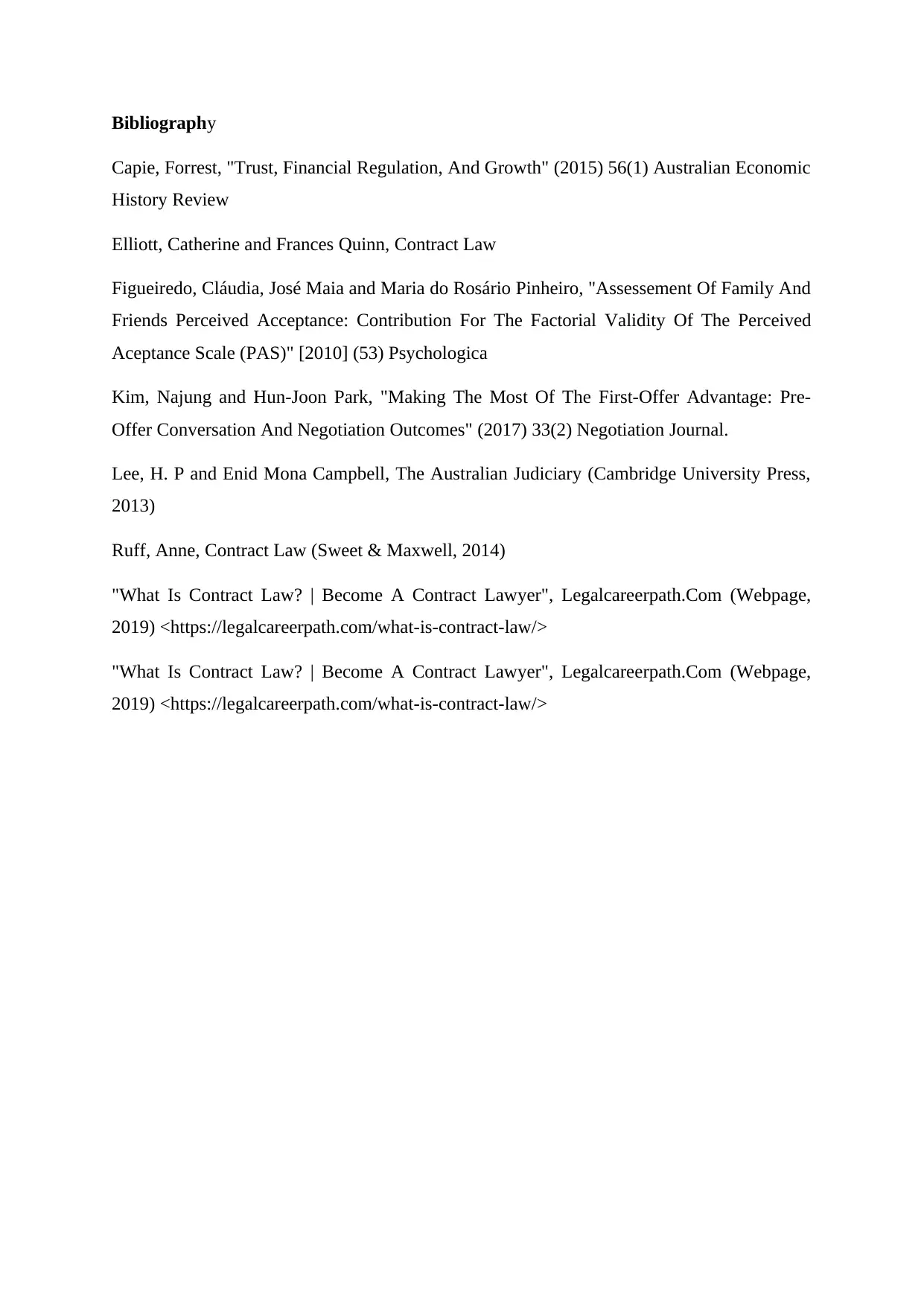
Bibliography
Capie, Forrest, "Trust, Financial Regulation, And Growth" (2015) 56(1) Australian Economic
History Review
Elliott, Catherine and Frances Quinn, Contract Law
Figueiredo, Cláudia, José Maia and Maria do Rosário Pinheiro, "Assessement Of Family And
Friends Perceived Acceptance: Contribution For The Factorial Validity Of The Perceived
Aceptance Scale (PAS)" [2010] (53) Psychologica
Kim, Najung and Hun-Joon Park, "Making The Most Of The First-Offer Advantage: Pre-
Offer Conversation And Negotiation Outcomes" (2017) 33(2) Negotiation Journal.
Lee, H. P and Enid Mona Campbell, The Australian Judiciary (Cambridge University Press,
2013)
Ruff, Anne, Contract Law (Sweet & Maxwell, 2014)
"What Is Contract Law? | Become A Contract Lawyer", Legalcareerpath.Com (Webpage,
2019) <https://legalcareerpath.com/what-is-contract-law/>
"What Is Contract Law? | Become A Contract Lawyer", Legalcareerpath.Com (Webpage,
2019) <https://legalcareerpath.com/what-is-contract-law/>
Capie, Forrest, "Trust, Financial Regulation, And Growth" (2015) 56(1) Australian Economic
History Review
Elliott, Catherine and Frances Quinn, Contract Law
Figueiredo, Cláudia, José Maia and Maria do Rosário Pinheiro, "Assessement Of Family And
Friends Perceived Acceptance: Contribution For The Factorial Validity Of The Perceived
Aceptance Scale (PAS)" [2010] (53) Psychologica
Kim, Najung and Hun-Joon Park, "Making The Most Of The First-Offer Advantage: Pre-
Offer Conversation And Negotiation Outcomes" (2017) 33(2) Negotiation Journal.
Lee, H. P and Enid Mona Campbell, The Australian Judiciary (Cambridge University Press,
2013)
Ruff, Anne, Contract Law (Sweet & Maxwell, 2014)
"What Is Contract Law? | Become A Contract Lawyer", Legalcareerpath.Com (Webpage,
2019) <https://legalcareerpath.com/what-is-contract-law/>
"What Is Contract Law? | Become A Contract Lawyer", Legalcareerpath.Com (Webpage,
2019) <https://legalcareerpath.com/what-is-contract-law/>
⊘ This is a preview!⊘
Do you want full access?
Subscribe today to unlock all pages.

Trusted by 1+ million students worldwide
1 out of 6
Related Documents
Your All-in-One AI-Powered Toolkit for Academic Success.
+13062052269
info@desklib.com
Available 24*7 on WhatsApp / Email
![[object Object]](/_next/static/media/star-bottom.7253800d.svg)
Unlock your academic potential
Copyright © 2020–2026 A2Z Services. All Rights Reserved. Developed and managed by ZUCOL.





